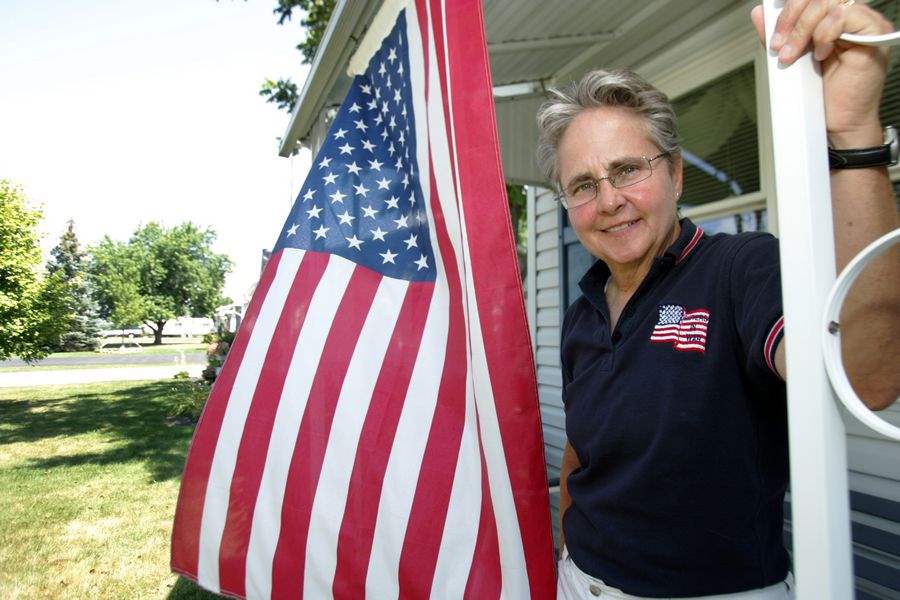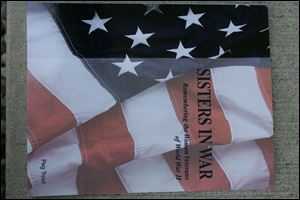
Book honors unheralded sisterhood of World War II
8/11/2008
Peg Trout dedicated her book, 'Sisters in War,' to her Aunt Flora Ausenbaugh, one of 400,000 women who served World War II.
Jetta Fraser / The Blade
Buy This Image

Peg Trout dedicated her book, 'Sisters in War,' to her Aunt Flora Ausenbaugh, one of 400,000 women who served World War II.
NORTH BALTIMORE, Ohio - In 1942, when women were allowed to enlist in the Army, Flora Ausenbaugh closed the doors to her beauty shop in North Baltimore and went off to war. She was 37.
"The cutoff was 40, and she was one of the older ones who enlisted," her great-niece, Peg Trout, said. "The average age for women in World War II was 25. The average age for men was 19."
Ms. Trout dedicated her recent, self-published book, Sisters in War, to her Aunty Flo.
Hers is one of 53 miniportraits of women from across the country who served their country during World War II as nurses, radio operators, mechanics, teletypists, parachute packers, and mail sorters. Though mostly unrecognized, the women were among more than 400,000 who joined the armed forces during the war, answering the call to "Free a Man to Fight," as one Army promotion beckoned.
"They really stepped into an unknown world," Ms. Trout said. "They laid the pathwork for women [who are in the military] today."
Ms. Trout, a health and physical education teacher who lives in California, said she was inspired by her Aunt Flo to join the Navy in 1970 while the United States was fighting in Vietnam. She had grown up listening to her aunt's stories and playing Army with her old uniforms.
"In high school when I found out what World War II was about, I really looked at her differently," Ms. Trout, 56, said. "I went in because of her, because of Aunty Flo. She was very proud."
Five years in the making, her book blossomed from a project she had done for a photography class in which she photographed women veterans at a veterans' retirement home in Chula Vista, Calif.

Sisters inWar tells the story of 53 World War II female veter-ans. Northwest Ohio women are among those whose accounts are in the book,which is available through online bookstores.
"You couldn't take their photograph without listening to their story," Ms. Trout said.
Two years later, she showed the project to another photography instructor who encouraged her to collect more stories, take more pictures, and write a book.
Nearly all of the veterans she tracked down were eager to talk to her, all but one Army nurse who had spent three years as a prisoner of war in the Philippines.
"She said, 'To talk to you I would have to go somewhere in my mind that I don't want to go,'•" Ms. Trout recalled. "I understood."
While the women came from different backgrounds and different parts of the country, all felt the call of duty more strongly than the comfort of home.
"The common thread was patriotism and wanting to do something for their country, wanting to help out with the war," Ms. Trout said. "Well, and there were some looking for adventure."
Elizabeth Dunipace of Bowling Green puts herself in all those categories.
At 23 and just a few years out of nursing school, she enlisted in the Army and put in for an overseas assignment
"That's the way I am. I will tackle most anything," Mrs. Dunipace, now 91, said, adding, "My brother was overseas, and I felt if he could go, I could go."
Ironically, Mrs. Dunipace, whose story is included in Ms. Trout's book, did not begin talking about her Army experiences until 1992, when she was being anesthetized for surgery. The nurses told her family afterward that she began babbling and barking out orders: "Lieutenant, get more plasma now. Are the right surgical tools ready? Watch out for the Japs."
After that, her family learned the whole story of how she cared for severely injured soldiers and prisoners of war in the Pacific Theater. She also began speaking to high school and university classes about her war experiences.
"That generation knew nothing about World War II, not a thing, and so many of them had relatives who were in the service," she said, adding that she had no qualms when Ms. Trout asked for an interview.
"Women were never recognized in World War II, I don't think," Mrs. Dunipace said. "I don't think people realize what women went through during the war, particularly those who enlisted and went overseas - the preparation, the marches. We did 15-mile marches with full field packs. We had to be prepared to do any marching or physical activity in order to keep us alive."
Ms. Trout's book, Sisters in War, will be available through several online bookstores or by e-mailing Ms. Trout at sistersinwar@earthlink.net.
Contact Jennifer Feehan at:
jfeehan@theblade.com
or 419-353-5972.